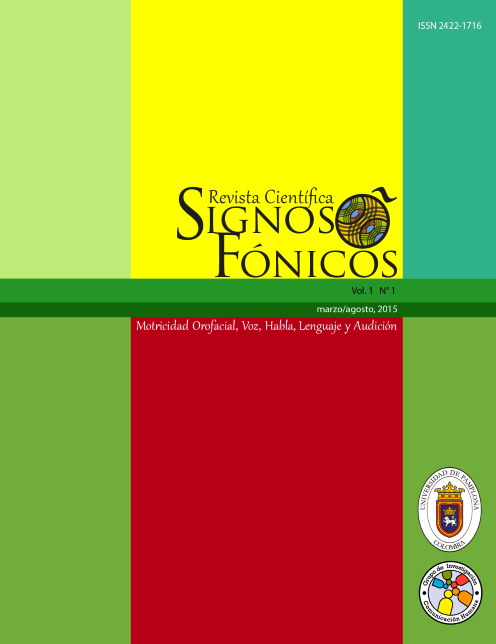Metodologías de Evaluación Fonoaudiológica del Componente Pragmático del Lenguaje en Infantes
DOI:
https://doi.org/10.24054/rcsf.v1i1.2072Palabras clave:
Evaluación, Comunicación, Protocolo, Lenguaje InfantilResumen
Introducción: El propósito de esta revisión fué reunir la evidencia disponible en bases de datos científicas respecto a las metodologías de evaluación del componente pragmático del lenguaje existentes y que den cuenta de los enfoques de acto de habla y hecho comunicativo. Métodos: Este estudio corresponde a la metodología de revisión sistemática Cochrane, incluyendo ensayos controlados y no controlados que emplearan la evaluación pragmática del lenguaje en niños de 0 a 5 años y 11 meses de edad o el uso de protocolos e instrumentos de evaluación del componente pragmático. Se realizó la búsqueda en bases de datos cientificas y no científicas y en fuentes adicionales de ensayos publicados. Resultados: Se encontró un total de 92 estudios de acuerdo a los criterios establecidos, de los cuales 54 fueron incluidos. Se realizó un inventario de las metodologías disponibles, describiendo sus propiedades, aspectos a evaluar y edades de aplicación. Análisis: Dentro de las metodologías encontradas, no existe una que logre contener o dar cuenta de la evaluación de los aspectos ilocutivos, perlocutivos y locutivos y del desempeño comunicativo de acuerdo a los roles asignados dentro de la comunicación, lo cual dificulta el abordaje de la teoría de los actos de habla en la evaluación del lenguaje, limitando la dinámica natural del lenguaje en el plano discursivo. Conclusiones: Los estudios revisados hasta aquí hacen referencia a categorías y sistemas de evaluación de la pragmática poco homogéneos. Palabras claves: Evaluación, Comunicación, Protocolo, Lenguaje Infantil.
Descargas
Referencias
Pelaez A, Rodriguez J, Ramirez S, Perez L, Vasquez A, Gonzales L. La Entrevista.
Carol A. Prutting DMK. A Clinical Appraisal of the Pragmatic Aspects of Language. Journal of Speech and Hearing Disorders. 1987;: p. 105-119.
Miguel Puyuelo Sanclemente LIMJSECORDC. Validación de los módulos semántico y pragmático de la Batería de Lenguaje Objetiva y Criterial (BLOC) en niños chilenos. Psicothema. 2006;: p. 326-332.
Gallardo B. Valoración del componente pragmático a partir de datos orales. REVNEUROL. 2009;: p. 57-61.
Bénédicte Blain-Brière CBNB. The role of executive functions in the pragmatic skills of children age 4–5. PubMed Central. 2014.
Montecinos JP. Adquisición y desarrollo del lenguaje y la comunicación: una visión pragmática constructivista centrada en los. Redalyc. 2000;: p. 54-66.
DEL VALLE ABRAHAM M, BRENCA RM. ANÁLISIS PSICOMÉTRICO DE LA EVALUACIÓN DEL ASPECTO PRAGMÁTICO DEL LENGUAJE. Redalyc. 2013;: p. 139-161.
Gallardo B. Habilidades lingüísticas pragmáticas en el Síndrome de Williams. Scielo. 2010.
Debora Maria Befi-Lopes MLPAREGJPGKdA. Perfil comunicativo de crianças com Alterações Específicas no Desenvolvimento da Linguagem: caracterização longitudinal das habilidades pragmáticas. Scielo. 2007;: p. 265-273.
Gallardo Paúls ByR. La investigación de los déficits pragmáticos Barcelona: Granada Linguistica; 2002.
Flecha MSR. Desde los actos de habla de Austin a los actos comunicativos. Perspectivas desde Searle, Habermas y CREA. Revista Signos. 2010;: p. 363-375.
Castello JAP. Entrenamiento de las habilidades comunicativas en niños con síndrome de Down. Anuario de Psicologia. 1997;: p. 75-95.
Angélica Savoldi LBBCLMBDCBHBM. Evaluation of pragmatic aspects of children with phonological disorders. CEFAC. 2014;: p. 1142-1150.
Clara Andres Roqueta RACE. Dificultades pragmáticas en el transtorno específico del lenguaje.El papel de las tareas mentalistas. Psicothema. 2010;: p. 677-683.
Clara Andres Roqueta RACRFB. Cognición social y competencia pragmática. El caso de los niños y niñas con trastorno esecifico del lenguaje. International Journal of Psychological Research. 2012;: p. 59-69.
Esther Moreno FD. Evaluación del componente pragmático en el Síndrome de Down a través del Protocolo Rápido de Evaluación Pragmática.. Investigacion en Logopedia. 2014;: p. 1-27.
Juan Manuel Moreno MEGEGMB. Competencia pragmática y adaptación psicosocial en niños sujetos a medidas de protección infantil. Salud Mental. 2010;: p. 333-340.
Maria del Valle Abraham RMB. Análisis psicométrico de la evaluación del aspecto pragmático del lenguaje infantil ICRA-A. Interdisciplinaria. 2014;: p. 139-161.
D B. Autismo, Síndrome de asperger y trastorno semántico-pragmático: ¿Dónde están los límites? 2004.
Hymes D. Competence and performance in linguistic theory. 1971;: p. 3-24.
Higgins JPT GS. Cochrane Handbook for Systematic Reviews of Interventions Version 5.1.0. The Cochrane Collaboration. 2011.
Carballo G. Guía para la evaluación del TEL: Algunas consideraciones. Logopedia, Foniatría y Audiología. 2012;: p. 87-93.
ADAMS CYBDV. “Conversational characteristics of children with semantic-pragmatic disorder.1: Exchange structure, turntaking, repairs and cohesion. British Journal of Disorders of Communication.1989;: p. 211-239.
Catherine Adams AC. Assessment of metapragmatic skills in children with typical language development and children with language disorders. Manchester. 1884.
Descargas
Publicado
Número
Sección
Licencia
Derechos de autor 2015 Mabel Xiomara Mogollón Tolosa, Edwin Mauricio Portilla Portilla

Esta obra está bajo una licencia internacional Creative Commons Atribución-NoComercial-SinDerivadas 4.0.











